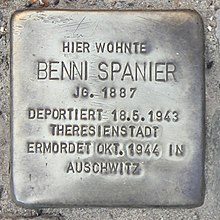Ben Spanier

Ben "Benni" Spanier (born October 4, 1887 in Munich ; died around October 14, 1944 in Auschwitz concentration camp ) was a German theater actor , director and acting teacher.
Life
Ben "Benni" Spanier began his career in 1910 in the Municipal Theater of Mulhouse in Alsace . From October 1911 , further stations were in Bern , Munich and Altona near Hamburg . He served in the Bavarian Army during World War I and then worked at the Residenztheater Berlin , where he also worked as a director for the first time.
In Frankfurt am Main , Spanier was a member of the Schauspielhaus ensemble from 1919 to 1931 . In Frankfurt he made a name for himself as a character actor as well as a director. He celebrated great success in Frankfurt and appeared in Carl Zuckmayer's Der Schinderhannes , Kornfeld's Kilian or the Yellow Rose , František Langer's The Conversion of Ferdisch Pistora and René Schickeles Hans im Schnakenloch . During these twelve years he played alongside colleagues such as Heinrich George , Toni Impekoven , Fritz Odemar and Paul Verhoeven as well as the later Nazi persecuted Jakob Feldhammer , Theodor Danegger and Lilli Kann . He was also an acting teacher at the local school.
Based in Berlin since 1932, Fritz Hirsch left Spanier with little odd jobs. After the National Socialists came to power , Spanier was dismissed in February 1933 due to the "efforts to aryanize". Benni Spanier joined the newly founded Jewish Cultural Association of Rhine-Ruhr , where he was able to continue his acting career, but mainly directed. He also directed the last performance of the Kulturbund, Ferenc Molnár's comedy Spiel im Schloß . He was listed as an employee there and so he and his wife could continue to maintain their home.
Deported to concentration camps
Even before the dissolution of the Jewish Cultural Association on September 11, 1941, Spaniards were sidelined. The couple was forced to live in a small apartment on Trautenaustrasse. The property was partially bombed out. One of the lodgers was deported in August 1942. Finally, on May 18, 1943, Spaniards were also deported and taken to the Theresienstadt concentration camp . There Spaniards were allowed to perform play in the castle with camp inmates again, but between October 1943 and August 1944 they could also be seen in other plays (e.g. Nathan the Wise ) and also took part in readings ( Georg Hermanns Jettchen Gebert , Wiener Gedichte turn of the century, classical ballads etc.).
On October 12, 1944, Spaniards were taken to the Auschwitz-Birkenau concentration camp and were probably gassed there as soon as they arrived .
Private life
Ben Spanier was married to Bella Clara Spanier, nee Schottenfels. She was also murdered in Auschwitz in October 1944. The two had a daughter together who could be withdrawn from the Nazis' access by a Kindertransport to England. On June 9, 2009, two stumbling blocks were laid for him and his wife in front of his former home in Berlin-Wilmersdorf . These were donated by the daughter.
literature
- Kay Less : Between the stage and the barracks. Lexicon of persecuted theater, film and music artists from 1933 to 1945 . With a foreword by Paul Spiegel . Metropol, Berlin 2008, ISBN 978-3-938690-10-9 , p. 319.
- Volume 2: Biographies the theater artist Part 2: L-Z . Edited by Frithjof Trapp, Bärbel Schrader, Dieter Wenk, Maaß, Ingrid. Series: Handbook of the German-speaking Exile Theater 1933-1945. Eds. Frithjof Trapp, Werner Mittenzwei, Henning Rischbieter, Hansjörg Schneider. DeGruyter Saur 1998. ISBN 978-3-110959-69-7 , p. 882.
Individual evidence
- ^ Bavarian Main State Archives IV ; Digitized copy, war log roll 15419 (Fig. 37) at ancestry.com, accessed on December 6, 2019
- ^ A b c Frank Siebold: Ben (Benni) Spanier. Stolpersteine-Berlin.de, accessed on August 16, 2015 .
- ↑ Stolpersteine Prager Str. 10. Berlin.de, accessed on August 16, 2015 .
| personal data | |
|---|---|
| SURNAME | Spaniard, Ben |
| ALTERNATIVE NAMES | Spaniard, Benni (nickname) |
| BRIEF DESCRIPTION | German theater actor, director and acting teacher |
| DATE OF BIRTH | October 4, 1887 |
| PLACE OF BIRTH | Munich |
| DATE OF DEATH | October 14, 1944 |
| Place of death | Auschwitz concentration camp |